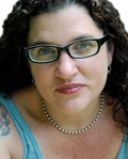Embarrassment
Creative Shame
Some notes on writing, entitlement, and the things they told us were unspeakable
Posted July 21, 2014
I’ve taught memoir writing and manuscript architecture for many years. Every season my students start out excited to tell their stories—at last. But around the middle of a workshop comes that sneaky emotional terror:
Who
The
F
Cares
?
My voice is unimportant.
No one reads books anymore, anyway.
My story has already been told.
I’m not good enough to tell it, anyway.
Who am I to think I could write a book?
It will never be done, anyway.
Who am I to think I could write?
Who am I to think?
Who am I?
Last week I was listening to a couple of novelists in conversation on public radio. I didn’t know their work, hadn’t read their books or heard their names before, but I liked them. They were funny and they were charming and they seemed to take their writing seriously, which makes me happy. They were New York Times bestselling authors, the radio show host reminded us. And they quoted Flannery O’Connor and they laughed and they talked about the symbolism of wooden legs and about class-conscious characters and the way people don’t change, really, and the fact that the “flashback” in writing needn’t be a false-feeling construction.
They had MFAs, the radio show host reminded us. Or maybe they had PhDs. But they were academics, one way or another. And they were glamorous. And now they were quoting Lord Byron and they kept mentioning New York and how all the writers were in New York but New York wasn’t a level playing field after all and as I listened, I started feeling like, Wow—these women are real writers. I mean, maybe New York isn’t a level playing field but these women are totally on the field. And they write about things that matter. Or if they don’t write about things that matter they write about people that matter to large numbers of other people—they write about straight people, they write about white people, they write about people in New York. I’ve been doing this writing thing a long time and I tell myself that writing is an outsider art but maybe I’m lying to myself. Maybe it’s very much an insider art and those women on the radio are on the inside and I’m not a real writer and I never have been and I’m on the outside. I don’t have an MFA. I don’t have a PhD. I can’t quote Flannery O’Connor. I’m more likely to quote my grandmother or Audre Lorde than I am to quote Lord Byron. And what a joke to think that I’m a writer.
To think.
I am.
When I got home I looked at my Amazon author page, at all the pretty book covers—the books I’ve published myself and the ones I’ve published with small presses and the ones I’ve published with big presses—and I nodded nervously at my computer screen and I reminded myself that I’m an author. Sometimes I’m an outsider author and sometimes I’m not such an outsider author and I quote who I quote, but I am, in fact, a real writer. A real author on top of that.
I know I’m no Stephen King, but I’m one of the most widely published people I’ve ever met, so I think it’s significant that I still feel this way: Off the field. Irrelevant if I’m working in solitude and undeserving if anyone pays attention.
There is so much shame—and so much sense of inadequacy—attached to being an artist of any kind. (As if we weren't already taking up too much space, eating too much food, costing too much money—now we must create bulky art as well?)
Sure, these women on the radio had some things I don’t have: somewhat fancier academic degrees, The New York Times, and New York.
But the one thing they really had on me—or exuded, anyway—the thing I struggle with because I was taught it was a bad thing in all contexts—the thing I was told made me unconscious and too big for my britches and a welfare queen all at once—is entitlement.
Entitlement.
Entitlement culture.
My government entitlements.
I was taught to avoid being—or seeming—entitled.
I was trained from childhood to deny my privilege.
My stepfather chaired the local Amnesty International and my mother was the art teacher on death row at San Quentin. And it was in poor taste, my parents seemed to feel, to admit to being well housed, unincarcerated, and well fed in a world where hundreds of millions are homeless, jailed, or hungry.
But here’s a paradox: I was also trained to see the hard things in my life as unspeakable.
My father’s paranoid schizophrenia was the first family secret I learned the language of: The crazy man in your grandparents’ basement who smells of turpentine does not exist.
But aren’t lies and secrets the things that make us paranoid? I wondered out loud. (“Oh, shut up with your smart-ass questions, Ariel.”)
I kept quiet.
As I grew, abuse would render me shameful. (“And anyway it wasn’t that bad, Ariel. Stop whining.”)
Young motherhood would ruin my life, and seeing as I’d pitifully failed to avoid it, I should lie about it. (“Tell them you’re 25, Ariel. Tell them you’re a widow.”) I wasn’t supposed to admit to my privileges—that would be in poor taste—but this abdication of privilege was unthinkable.
Being queer was the final nail in the coffin of my so-called acceptability. (“You’re not that ugly, Ariel, you could get a man. At the very least, hide the women. There’s no need to make yourself a minority when you can pass.”)
Now overlay on all that the financial reality of being a working writer who is also the primary caregiver and for decades the only breadwinner for her family. . . and it does seem to add up to “Good luck,” which is what the junior college career counselor guffawed at me when I admitted that I wanted to be a writer when I was 19 and a new mom.
Or.
Well.
Wait.
Maybe it doesn’t.
Maybe it doesn’t add up to that junior college counselor’s own fears.
Maybe it all adds up to excellent circumstances.
Maybe this is exactly what the writer needs:
Just enough suffering + Just enough safety.
Maybe I was slapped across the face and told to shut up just often enough to imbue the very cells of my body with an existentialist artistic angst but not often enough to break my quiet resolve to make something in response to the indignity.
And there’s entitlement in that resolve.
Because, see, a writer needs to feel entitled: I deserve to express the creative spirit this vast and magical universe has ignited me with.
As I’ve mentioned before, I encourage anyone who wants to make writing from life and a life from writing to go for it, but part of me also believes that this life-writing thing belongs to us—the misfits and the runaways, the single moms and the queers, the sex workers and the small-time gardeners.
And if you’re one of us, you’ve probably been made to feel—at one point or another—that you’re unimportant and irrelevant. If you’re too young, you don’t know anything. If you’re too old, you’re washed up. Whoever you are, wherever you live, shut up. Your creative expression is harshing the mellow of my violent capitalist reality.
If you’ve insisted on telling your stories anyway, you’ve probably been made to feel—at one point or another—that your work is self-indulgent, self-interested, narcissistic. (Who. The. F. Cares?)
If you’ve found any success, you’ve probably been made to feel—at one point or another—that you should be ashamed of yourself. (Nobody cared. And you went and did it anyway.) But here’s the speedball irony of that shaming: Those are the same voices that were trying to shame you from the start.
And now those voices live in our brains.
It’s like what Tom Spanbauer says: “Most of what we fear is internal. Most of what we fear is the way we've internalized our parents, our religion, the bullies who hated us.”
The crazy man in your grandparents’ basement who smells of turpentine does not exist. You’re embarrassing yourself by saying that he exists. Don’t go back there behind the house. Don't go near that door. Don't touch the door knob. Don’t open it. Don’t. Good God, now look at what you’ve done. You’ve opened the door. Shame on you.
But those voices—external and internal—are liars.
The crazy man steps out into the light. He blinks, a little bewildered. He doesn't smile. He looks up at the stand of eucalyptus trees in front of him.
He is entitled to be here.
And I am entitled to be here.
And you are entitled to be here.
No more shameful than that stand of eucalyptus trees and the salted wind rustling its leaves.
Keep working.




